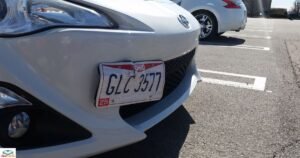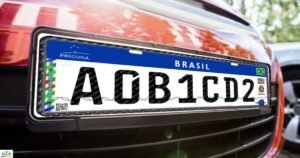License plates are ubiquitous identifiers attached to vehicles, offering a means of tracking and identifying cars on the road. Many people wonder about the extent to which this seemingly innocuous piece of metal can glean personal information, such as one’s residence, as concerns about privacy and security rise.
In this article, we delve into the question, Can someone find where you live from your license plate?
Understanding License Plate Data
License plates serve as unique identifiers for vehicles, typically consisting of a combination of letters, numbers, and sometimes special characters.
Every vehicle owner must register their car with the local Department of Motor Vehicles (DMV) or equivalent authority, providing their personal details along with the vehicle’s make, model, and license plate number.
Law enforcement agencies, insurance companies, and certain authorized entities can access the databases where this information is stored.
How License Plate Data is Used

Law Enforcement: Police officers use license plate data for various purposes, including identifying stolen vehicles, locating suspects, and enforcing traffic laws.
Toll Booths and Traffic Cameras: Automated systems at toll booths and traffic cameras capture license plate data for billing purposes and traffic monitoring.
Parking Enforcement: Parking authorities may use license plate data to monitor parking violations and issue citations.
Insurance Claims: Insurance companies may access license plate data to process claims related to accidents or other incidents involving vehicles.
Access to License Plate Information
Depending on jurisdiction and the purpose for seeking information, authorities regulate access to license plate data to varying degrees.
While law enforcement agencies typically have broad access to such data for investigative purposes, access for other entities may be more restricted. This information has raised concerns regarding its potential misuse or unauthorized access.
Risks of License Plate Data Exposure

| Risk | Description |
| Privacy Concerns | Reveals sensitive information about individuals’ movements |
| Stalking and Harassment | Malicious actors track individuals’ routines |
| Identity Theft | Linked to personal information, increasing fraud risk |
| Home Address Disclosure | Potential inference of residence from license plate |
| Unauthorized Access | Risks of misuse or access by unauthorized parties |
License plate data exposure can lead to privacy breaches and increase the risk of stalking, identity theft, and unauthorized access to personal information. It’s crucial to take steps to safeguard this sensitive data and minimize potential risks.
Methods of Locating a Residence from a License Plate
Despite the safeguards in place to protect personal information, there are still ways in which someone could attempt to locate a residence using a license plate number:
Online Databases and Services
Public Records: Some online databases aggregate publicly available information, including vehicle registration data, which may be searchable by license plate number.
Social Media and Online Platforms: Individuals may inadvertently reveal their home address by posting photos or videos online that include their vehicle’s license plate. Can satellites read license plates?
Social Engineering and Surveillance
Tailgating: Determined individuals could follow a vehicle to its destination to ascertain its owner’s residence.
Impersonation: Malicious actors may try to impersonate law enforcement or other authorized personnel. They aim to obtain license plate data from relevant agencies.
Mitigating the Risks
It may be challenging to entirely eliminate the risks associated with license plate data exposure. There are steps that individuals can take to mitigate these risks:
Privacy Settings: Be mindful when sharing information online. This includes photos or videos that may inadvertently reveal license plate numbers or other identifying details.
Secure Parking: Park vehicles in secure locations whenever possible to minimize the risk of unauthorized access to license plate data.
Report Suspicious Activity: Be vigilant. Report any suspicious behavior or unauthorized access to license plate data to the appropriate authorities.
FAQ’s
How can someone use my license plate to find my home address?
Someone could potentially use online databases or social engineering tactics to infer your home address from your license plate number.
Is it legal for anyone to access license plate data?
Access to license plate data is typically regulated. Law enforcement agencies and certain authorized entities have legitimate access for specific purposes.
Can license plate data be misused for stalking or harassment?
Yes, malicious actors could potentially misuse license plate data to track individuals. This poses risks of stalking or harassment by gathering information about their routines.
Conclusion
It’s technically possible for someone to locate a residence from a license plate number. The likelihood of this scenario depends on factors like database access and the individual’s effort and resources.
Vehicle owners should be aware that license plate data exposure poses risks. They should take precautions to protect their privacy and security.










